Fall Gardening Tips
Air Date: Week of October 1, 2021
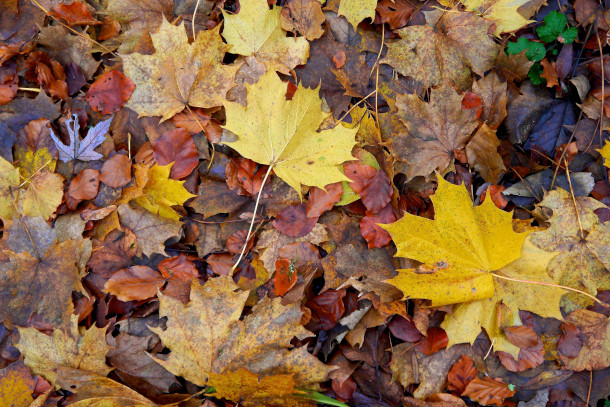
Leaves are loaded with trace minerals that trees absorb from the soil and when used in the garden they can feed earthworms and good microbes. (Photo: Hywel Jones, Flickr, CC BY-NC-ND 2.0)
For gardeners in the cooler parts of the Northern hemisphere, now is the time to take stock of this year’s successes and failures. Michael Weishan, a master gardener and Living on Earth regular, joins Host Bobby Bascomb to talk about what worked and what didn’t in his garden this year and what gardeners can do to build fertile soil for next spring.
Transcript
CURWOOD: So, Bobby, September 20th was the harvest moon.
BASCOMB: It was. Yeah….
CURWOOD: I managed to get a few tomatoes out of my little garden bed, especially the sun sugars cherry tomatoes Michael Weishan suggested in the spring, but I know you actually have a pretty big garden at your place. How did it go this year?
BASCOMB: Well, you know we had a bumper crop of kale this year as every year. Everyone who came to my house actually had to go home with an arm load of kale. But the broccoli was kind of a bust and so was the cabbage.
CURWOOD: Ahh… better luck next year.
BASCOMB: Yes! But you know, Steve, gardening season never really ends. This is a fine time around here to plant a last crop of cold hardy plants like lettuce. You can get garlic in the ground pretty soon and a lot of perennial flower bulbs are actually planted in the fall. And so for some more fall gardening tips let’s bring back Michael Weishan. He’s our gardening guru and former host of the Victory Garden on PBS. Michael, welcome back to Living on Earth!
WEISHAN: It is a delight to be back as always.
BASCOMB: Oh, it's always so fun to have you. So how did your garden grow this summer?
WEISHAN: Oh, well, I would honestly say this has been the most miserable gardening year I've had in the last 20.
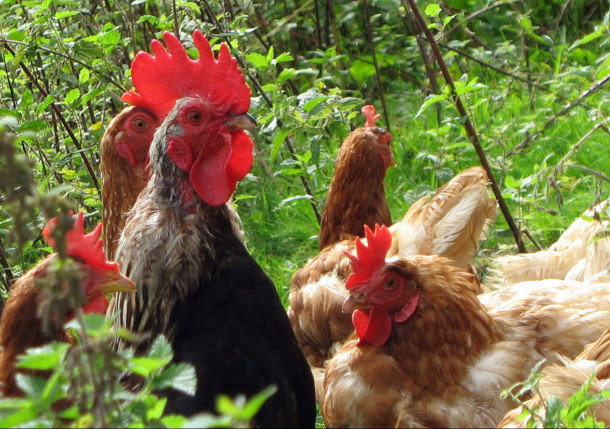
Chickens love to eat almost everything and are great for breaking down leaves. (Photo: Jen Zajac, Flickr, CC BY 2.0)
BASCOMB: Wow.
WEISHAN: Our weather has been terrible here in New England, brutally hot summers and very rainy with feet literally rain. So any problem that you could imagine that would come out with lots of rain and humidity did. Slugs all over the place, every type of fungal mildew, downy mildew kind of problem insects galore. But you know, you take your successes where you get them, right. I grew celeriac this year, which failed last year. And this year I have huge, you know, softball sized bowls of celeriac to store for the winter. Which, if you don't know what that is, it's a wonderful vegetable. It's a bulbous vegetable relative of the carrot family, parsley family that forms this large naughty-like ball that has the flavor of celery. So you don't have to buy celery then in the winter you can store this because it stores like a potato. And they're just delicious in soups and stews and other things where you would normally put celery and it holds up a little better because it has an evolved like you know squash like consistency.
BASCOMB: Yeah, I've had them from CSA shares in the past I've never tried growing them though. But I know they're nice said just chop up and roast in the in the oven like a root vegetable.
WEISHAN: Exactly. And you know, they're really interesting plants, you can eat the greens, which look like celery, and tastes like celery, very strong celery, but they're very handsome plant. I was very excited. So that did well. I'll tell you, you know, and share with our listeners. Even the flower border did not do well this year. I mean, the long perennial border did, but the cut flower garden with all the rain and stuff, I mean the cosmos, it just it's all went down. I'm ready to be done.
BASCOMB: You're ready to be done.
WEISHAN: Yeah Bobby, I'm ready to be done. I'm moving on to 2020 where are we 2022. Now coming up.
BASCOMB: Oh man, you know, I always feel like this is a great time to reflect back on the summer and think about those things that didn't work out so well and things that that worked out better. And you know, I should probably write notes to my future, you know, spring planting self about things like that, you know, things like, don't plant the basil near where the ground cherries always come up and shade the basil and then swear that you'll be better about weeding them out because you won't. Do you have any of those kind of lessons learned this year?
WEISHAN: Well, I think you've stated the lesson learned which is to keep a diary. And if nothing else, just note down things that worked and that didn't. I mean, for instance, I've mentally noted to myself last year that I put the celeriac in a not sunny enough space so I shifted it this year and it did really well. I really think this is the time of year for review and really thinking about, while you can still see it, you know, while it's still there, what worked and what didn't what needs to be moved around. And keep those notes in a viable format, whatever works for you, for next year.
BASCOMB: Well, I know you said you're ready to give up on gardening for the year but are there any plans that maybe listeners should think about focusing on this time of year? I mean, here in New England, we still have weeks or so before frost and in other parts of the country, maybe this is a fine time to plant.
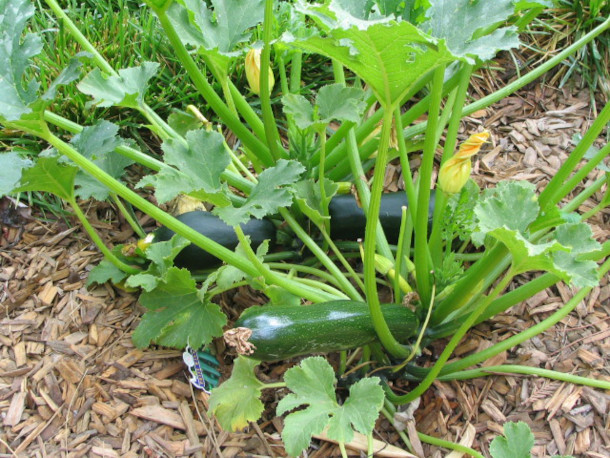
It was a tough year to grow zucchini due to hot and wet weather in the Northeast US (Photo: Thomas Kriese, Flickr, CC BY 2.0)
WEISHAN: So with that in mind, there's still time for lettuces and other crops here. Pretty much now it's a harvesting question in New England. But if you're in the south, or if you're in the West, this is the beginning of the gardening season, at least the cool weather gardening season. So all the cool weather crops that we would be planting normally in the spring, they start now because this is their more temperate time as opposed to being baked, which has been the case. So you know, it's been a tough year. And I think that's something that we need to think about the adaptability of, you know, our plans and how rigid we are in changing things around and adapting more. For instance, the growing seasons are shifting, there's no doubt about that. And the climate zones are shifting North so it's getting warmer. We here had historically been in 5B but I was just reading the American Horticultural Society thinks we're now in 6B, you know we're up a zone almost since 1970. And another 20 years would put us into 7. That's a huge shift, there's a whole border line between five and six and seven of plants you can grow and not grow. And as you shift further south, you knock out the cold weather crops, things that do very well and only cool temperatures. So you know, I think there has to be a realization that we need to change what we're doing. It's Mother Nature you gotta move with her because we move against her she's gonna whack you down like a mole.
BASCOMB: [LAUGH] Yes, there's certainly no use in fighting Mother Nature, you just have to roll with it as you said. I guess here in New England though, I mean a longer growing season kind of sounds attractive. I mean, if you have to find a silver lining to all of the horrible things associated with climate change, at least we get another month or so out of our growing season.
WEISHAN: Yeah that's true so I mean you know, things like we were talking about like the leeks and the celeriac and other really long season crops that we wouldn't have time for sometimes like and big huge pumpkins and things if the start of the season is earlier then you can plant this stuff much earlier and move all the way through everything has a silver lining to it so it's not doom and gloom right? But there are changes that we need to make as you know gardening folks to adapt to the new reality.
BASCOMB: Well, you mentioned earlier that many many challenges that you've had and I think we've all had this year with gardening and one of them that I really struggle with is pests. I actually only harvested one zucchini this year. Usually I'm you know, leaving them on neighbor's porches you know, neck deep and zucchini bread by now but the squash vine borers were just horrible. Is there anything gardeners can do now in the fall to maybe mitigate next year's pests?
WEISHAN: Well, you beat me by one because I had no zucchini.
BASCOMB: Oh, really? Oh, gosh, that makes me feel slightly better. I'm sorry for you.
WEISHAN: Yeah, the plants disappeared. I mean, how can you lose zucchini? That was a factor of the extra warmth. so the moths, the borer moths that lay the eggs were around a lot longer than they normally were. So you know that if you use row cover over the squash, when the moths are active, then they don't have time to lay their eggs and so you'd then uncover them and generally you're good to go. But this year, I thought it was late enough I planted them out and they were all destroyed.
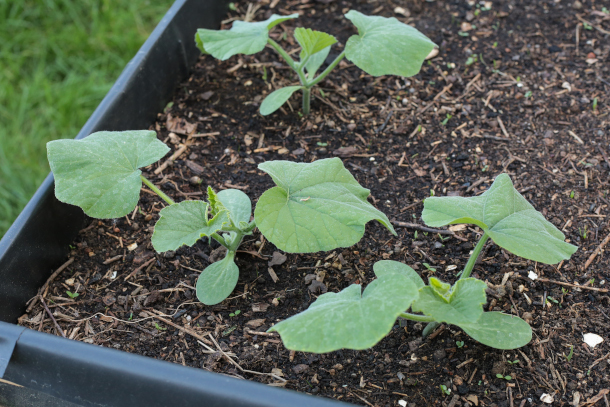
Small leaves sprouting in a garden bed (Photo: Maja Dumat, Flickr, CC BY 2.0)
BASCOMB: Wow.
WEISHAN: So you know, there's things that you do now, not in terms so much of insect pests, but in terms of disease, for instance, tomatoes with late blight, those vines should be removed and not composted they should be disposed of or burned. So you know, soil you know, again, this is really the time to think about soil and we do it now south of here we'll be doing it in a month or twos time before Christmas in general. There are many things you can do in the fall in terms of soil improvement, whether it's cover crops or other type of enhancements. We've done cover crops, winter rye, is one of the most common. Although I was reading about these giant radishes have you had these radishes as a cover crop?
BASCOMB: No.
WEISHAN: That they grow very quickly in a very deep, long roots and then they die and rot and essentially form these cavities in the soil so that in the spring, they've sort of aerated your soil without tilling.
BASCOMB: I like the idea.
WEISHAN: A friend of mine told me about that, I have took a look into that because that is sort of a that's a revolutionary kind of concept to me. I use leaves for soil improvement because you have a billion of them and what are you going to do with them you have to get them to go somewhere. So what I do is I collect them in tarps and then layer them on to the beds and let them sit for the winter and if they're wet, they form a mat and they don't blow around and in the spring, then very early on I get out there till them in and break them up. Now they won't be fully composted, but once they're chopped within about three or four weeks, they decay very quickly so then I rototill them again. And that improves what's called the tilth of the soil which is the ability to absorb moisture and air in particular oxygen into the roots. So it gives you that fine crumbly soil it's minimally also nutritional you know the other way to get rid of the leaves is with chickens. Did I ever tell you this story?
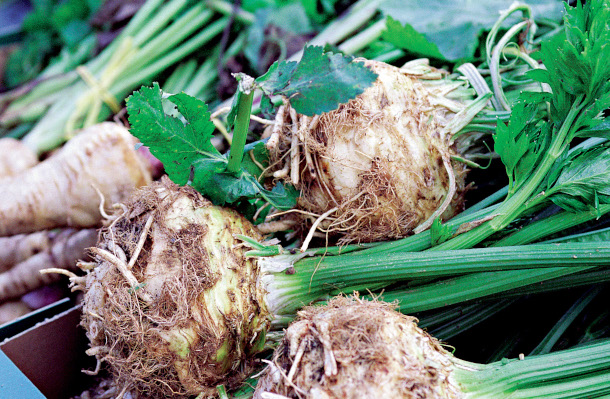
Celeriac is a bulbous plant with a similar taste to celery (Photo: Skanska Matupplevelser, Flickr, CC BY-ND 2.0)
BASCOMB: I don't think so.
WEISHAN: So you can actually, the chickens scratch in order to forage and if you put all the leaves in the chicken coop area, they will scratch them into the ground and by spring they will be totally gone. And I'm talking huge like two foot tall piles of leaves the chickens get into the into the piles and they're like scratch, scratch, scratch, scratch, scratch and there's like leaves flying up all over it, you know it's just the craziest thing to see. And essentially they do with the rototiller does in the spring right? It just eliminates them entirely. So if I have too many of these I don't know what to do with, rather than hauling them to the town composting area I just give them to the chickens, so.
BASCOMB: Yeah, you and I both have chickens and I love this idea of a chicken tractor they sometimes call it you know, the idea of being just let the chickens into the garden when you're done growing everything because otherwise they'll you know, peck holes and every tomato you have. But you let them into the garden, they eat the grubs and snails and all these little things that are going to cause you problems, scratch up the soil, maybe leave some fertilizer behind. Do you ever do that sort of thing?
WEISHAN: I am too lazy to roll a giant chicken caravan around my property. I use ducks for that purpose because, you know again, as we were talking about the chickens love to scratch but the ducks because they trill the soil as opposed to scratch it they trill it with their beaks. So they search for worms and other things underneath that way. They do very well eating grubs. They love slugs, and earthworms which I'm not so excited about them eating but any type of bug moving ticks. They're also big consumer of ticks and so I have ducks and geese for that purpose. They keep the algae on the pond down in the summer and then In the fall in the spring I let them wander around the beds and especially in the orchards they eat all the falls too, which is great.
BASCOMB: Do you do anything with the waste from your chickens and your ducks in terms of you know, composting their manure for fertilizer or anything like that?
WEISHAN: Oh, yeah, yeah. When it's cleaned out, it all goes in the compost pile and it's mixed in with the garden waste and all this stuff and it produces an incredible compost. And I have three huge compost bins that are just fantastic for producing large quantities of compost, which I then use mostly as potting soil.
BASCOMB: Yeah, exactly. And I have to say, you know, talking with you a master gardener who knows everything there is to know about gardening makes me feel a lot better about my own gardening failures this summer. You know, my one sad zucchini and shriveled up cabbage, they don't seem so bad. Michael Weishan is a master gardener. He's been host of the Victory Garden on PBS and a regular garden help here on Living on Earth. Michael, thanks again for taking this time with me today, it's always so much fun to chat with you.
WEISHAN: Absolutely. Absolutely Bobby, thank you so much.
Links
Learn more about Michael Weishan’s World of Gardening
Listen to Living on Earth’s conversation with Michael Weishan about 2020 Fall Gardening Tips
Living on Earth wants to hear from you!
Living on Earth
62 Calef Highway, Suite 212
Lee, NH 03861
Telephone: 617-287-4121
E-mail: comments@loe.org
Newsletter [Click here]
Donate to Living on Earth!
Living on Earth is an independent media program and relies entirely on contributions from listeners and institutions supporting public service. Please donate now to preserve an independent environmental voice.
NewsletterLiving on Earth offers a weekly delivery of the show's rundown to your mailbox. Sign up for our newsletter today!
 Sailors For The Sea: Be the change you want to sea.
Sailors For The Sea: Be the change you want to sea.
 The Grantham Foundation for the Protection of the Environment: Committed to protecting and improving the health of the global environment.
The Grantham Foundation for the Protection of the Environment: Committed to protecting and improving the health of the global environment.
 Contribute to Living on Earth and receive, as our gift to you, an archival print of one of Mark Seth Lender's extraordinary wildlife photographs. Follow the link to see Mark's current collection of photographs.
Contribute to Living on Earth and receive, as our gift to you, an archival print of one of Mark Seth Lender's extraordinary wildlife photographs. Follow the link to see Mark's current collection of photographs.
 Buy a signed copy of Mark Seth Lender's book Smeagull the Seagull & support Living on Earth
Buy a signed copy of Mark Seth Lender's book Smeagull the Seagull & support Living on Earth

